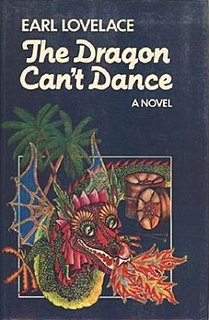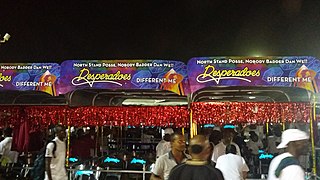Related Research Articles
The music of Trinidad and Tobago is best known for its calypso music, soca music, chutney music, and steelpan. Calypso's internationally noted performances in the 1950s from native artists such as Lord Melody, Lord Kitchener and Mighty Sparrow. The art form was most popularised at that time by Harry Belafonte. Along with folk songs and African- and Indian-based classical forms, cross-cultural interactions have produced other indigenous forms of music including soca, rapso, parang, chutney, and other derivative and fusion styles. There are also local communities which practice and experiment with international classical and pop music, often fusing them with local steelpan instruments.

The steelpan is a musical instrument originating from Trinidad and Tobago. Steelpan musicians are called pannists.

The Trinidad and Tobago Carnival is an annual event held on the Monday and Tuesday before Ash Wednesday in Trinidad and Tobago. The event is well known for participants' colorful costumes and exuberant celebrations. There are numerous cultural events such as "band launch fetes" running in the lead up to the street parade on Carnival Monday and Tuesday. It is said that if the islanders are not celebrating it, then they are preparing for it, while reminiscing about the past year's festival. Traditionally, the festival is associated with calypso music, with its origins formulated in the midst of hardship for enslaved West and Central Africans; however, recently Soca music has replaced calypso as the most celebrated type of music. Costumes, stick-fighting and limbo competitions are also important components of the festival.
The Canboulay riots were a series of disturbances in the British colony of Trinidad and Tobago in 1881. The riots came about in response to efforts by the colonial police to restrict aspects of the island's annual Carnival festival. In Port of Spain, San Fernando and Princes Town, angered Trinidadians rioted in response the actions of the police; several people were killed as a result of the riots. Canboulay music forms an important part the musical traditions of Trinidad and Tobago, including the usage of steelpans, which were outlawed by the colonial police in the 1880s. The "chantwell" or chantuelle who was also an integral part of the celebrations was the forerunner of the calypsonian and later soca music.
The culture of Trinidad and Tobago reflects the influence of South Asian, African, Amerindian, European, Chinese, American, and Arab cultures. The histories of Trinidad and Tobago are different. There are differences in the cultural influences which have shaped each island. Trinidad and Tobago is an English-speaking country with strong links to the United Kingdom.
David Michael Rudder is a Trinidadian calypsonian, known to be one of the most successful calypsonians of all time. He performed as lead singer for the brass band Charlie's Roots. Nine years later, Rudder stepped outside the band, entering the calypso tent as a solo calypsonian in 1986, which was followed by an unprecedented rise to fame.

The Dragon Can't Dance (1979) is a novel by Trinidadian author Earl Lovelace, his third to be published. Set in Port of Spain, the novel centres on the life of Aldrick Prospect, a man who spends the entire year recreating his dragon costume for Carnival. Aldrick's interactions with other people who live in his neighbourhood form the backdrop for their individual struggles for self-definition in a society dominated by its racial divisions and colonial legacies. The story culminates with Aldrick and Fisheye, along with a small number of followers, hijacking a police van and taking two police officers hostage. The events surrounding the hostage-taking, and the aftermath of the event, lead the reader on a journey through the colonial psyche, and expose the deep-seated problems of a society that still has not reconciled itself with its colonial past and racial divisions.

Ralph Anthony MacDonald was a Trinbagonian-American percussionist, songwriter, musical arranger, record producer, steelpan virtuoso and philanthropist.

Elliott Anthony "Ellie" Mannette was a Trinidadian musical instrument maker and steel pan musician, also known as the "father of the modern steel drum".
George "Sonny" Goddard was a steelpan enthusiast and President of the Steelband Association. George Goddard is still recognised for his work with the steelpan.
The Trinidad All-Steel Pan Percussion Orchestra (TASPO) was formed to participate in the Festival of Britain in 1951. The group was the first steelband to travel abroad from Trinidad and Tobago, presenting the newly invented steelpan to an international audience.
Panorama is an annual music competition of steelbands from Trinidad and Tobago, taking place since 1963. It is usually held around Carnival time.

Sterling Betancourt MBE, FRSA is a Trinidad-born pioneer, arranger and musician on the steelpan, a major figure in pioneering the Pan in Europe and the UK (1951).
Russell Audley Ferdinand "Russ" Henderson was a jazz musician on the piano and the steelpan. Originally from Trinidad and Tobago, he settled in England in the 1950s. He is most widely recognised as one of the founding figures of the Notting Hill Carnival in London, United Kingdom.

Clive Bradley was a known arranger of steelpan music.
Anthony Williams, ORTT, CM, also known as "Muffman", was an inventor, pioneer and musician of the steel pan.

The Desperadoes Steel Orchestra, also called Despers, are a steelband from Laventille in Trinidad, formed in 1945.
Rudolph Charles was a musician and instrument maker of the steelpan, but most notably, he was a pioneer and leader of the steelband movement in Trinidad and Tobago. Also known as Charlo, The Hammer and Trail, among other names, he led Desperadoes Steel Orchestra to 10 various victories from 1965 to 1985, including six Panoramas, two Classical Music Festivals, one Best Bomb and one Best Playing Steel Orchestra.
Tamboo bamboo is a Caribbean percussion instrument (idiophone) created in the Caribbean, and is a notable precursor to the creation of steelpan. Its name derives from the French word for drum (tambour) and the material from which the instrument is predominantly made from. It is still played by carnival-goers in Trinidad today, although it was the dominant instrument at carnival at the turn of the twentieth century.

Winsford Devine, known by the sobriquet Joker, was a Trinidad and Tobago songwriter who composed over 500 calypsos. He worked with The Mighty Sparrow for 17 years, writing many of Sparrow's hits including Slave, Philip, My Dear, and Marajhin. Devine was also the composer of Progress which has been ranked among the best calypsos ever.
References
- 1 2 3 4 5 Johnson, Kim (2011). "'If yuh iron good you is king', 1939". From tin pan to TASPO: steelband in Trinidad, 1939-1951. Kingston, Jamaica: University of the West Indies Press. pp. 29–37. ISBN 978-976-640-254-9. OCLC 733093608.
- ↑ Stuempfle, Stephen (1995). The steelband movement: the forging of a national art in Trinidad and Tobago. Philadelphia: University of Pennsylvania Press. pp. 32–37. ISBN 0-8122-3329-8. OCLC 33047255.